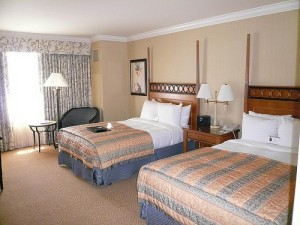Source: JustMeans.com
Largest U.S. Hotel Companies Work to Prevent Human Trafficking
 America's largest hospitality companies are training their employees to spot cases of human trafficking at hotels.
America's largest hospitality companies are training their employees to spot cases of human trafficking at hotels.Last month, Congress passed the Trafficking Victims Protection Reauthorization Act, a law that had expired in 2011 which seeks to prevent human trafficking in the United States. The day before the House vote, Governor Matt Mead signed the first anti-trafficking law in Wyoming, making his state the 50th and final U.S. state to illegalize the trafficking of individuals for commercial sex or forced labor.
Americans tend to link human trafficking with other "third world problems" like genocide and famine, but in 2011 there were 4,239 convictions in human trafficking cases across the country. Each year, between 15,000 and 60,000 individuals are brought into the United States and held against their will as victims of human trafficking.
Typical of these cases is the story of Maria, a Filipino woman who paid a large recruitment fee to come to the United States under a guest worker program. Promised housing, transportation and a lucrative job in the hospitality industry, Maria arrived to find no work and squalid living accommodations.
Maria's passport was seized and she was prevented from leaving the house. The recruiters, who were eventually indicted by a grand jury for conspiracy to hold workers in a condition of forced labor, fed Maria and the other captives chicken innards and responded to their complaints with threats of deportation.
Legislative efforts like the ones passed in Wyoming and at the federal level last month have helped curtail the worst of these abuses, but equally important has been the work of hotel companies that are working to prevent trafficking-related crimes on their properties. The United States hospitality industry has coalesced around an effort by ECPAT USA, short for End Child Prostitution and Trafficking, a nonprofit that introduced the Tourism Child-Protection Code of Conduct in 2004.
Carlson, owner of Radisson Hotels and other chains, was the first U.S. travel and hospitality company to sign "the Code," and has since been joined by the Wyndham Worldwide Corporation, the Real Hospitality Group and Hilton Worldwide, among several other U.S. companies.
"Some girls are tattooed with things like 'Daddy's girl,'" a sign that she may have been branded by her captor, said Brenda Schultz, who oversees Carlson's hotel training program, in an interview with the New York Times. Schultz added that housekeeping staff at Carlson-owned hotels is trained to identify signs of prostitution, like an unusually large number of electronic devices in guest rooms or several condoms in the wastebasket.
Hilton Worldwide, which already supported several ECPAT principles before actually signed the Code in 2011, has training programs at both the leadership and department levels to teach hotel employees to identify and recognize illicit activities and better understand the issues surrounding child trafficking.
The company has also taken it a step further, working with several nonprofit organizations, including the Somaly Man Foundation, Vital Voices and Room to Read, in order "to bring more resources and opportunities to survivors as well as strengthen organizations that are on the frontlines of fighting child sex trafficking," according to Jennifer Silberman, the company's Vice President of Corporate Responsibility.
"We decided to sign the ECPAT Code because it was important for us to support the principles that prevent and mitigate child sex trafficking," Silberman told Justmeans in an email. "We support ECPAT-USA's important mission to protect children from sexual exploitation and to bring greater attention to the issues surrounding child trafficking."
Jami Day directs the corporate responsibility efforts at the Real Hospitality Group, a hotel management company. Day recently emphasized the importance of EPCAT's work in a panel discussion hosted as part of the 2013 United Nations Commission on the Status of Women.
"As a leader in the hospitality industry, Real Hospitality Group is proud to use our sphere of influence to do whatever we can to pragmatically impact the issue," said Day, who is a member of the ECPAT Board of Directors. "We are proud to be an ECPAT Code of Conduct signatory, taking a position of protecting those most vulnerable in our communities."
More information about ECPAT USA's work is available at the organization's website.
Image credit: Michael Gray, Flickr














